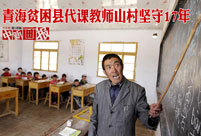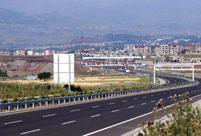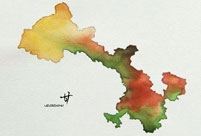 The life of a model: Not as glamorous as it seems
The life of a model: Not as glamorous as it seems
 Hello Kitty, happy 40th birthday!
Hello Kitty, happy 40th birthday!
 The Western Qing Mausoleum
The Western Qing Mausoleum
 Avant-garde approach to graduation photos
Avant-garde approach to graduation photos
 Early PLA posters, signatures of an era
Early PLA posters, signatures of an era
 First Russian Street in Tianjin open to public
First Russian Street in Tianjin open to public
 Motorcycle stunt on the Bund
Motorcycle stunt on the Bund
 French Spiderman Alain Robert climbs up Galaxy Hotel in Macao
French Spiderman Alain Robert climbs up Galaxy Hotel in Macao
 Africans in Guangzhou
Africans in Guangzhou
 Pole dancer shows strength and beauty up in the air
Pole dancer shows strength and beauty up in the air
DHULIKHEL, Nepal, May 6 -- Asian neighbors Nepal and China have been boosting their ties with the help of the latter's Confucius Institute.
Dr. Ram Kanth Makaju Shrestha, Vice Chancellor of Kathmandu University (KU), told Xinhua in an exclusive interview Sunday that the Confucius Institute can act as a bridge between the two peoples.
"I hope that in the future, the Confucius Institute in Nepal can play a bigger role in creating awareness among the Nepalese about the Chinese culture, economy and society," Shrestha said.
The high-level Chinese language and culture institute was established through the joint efforts of Hebei University of Economics and Business and the KU in 2007.
Shrestha, who has recently come back from a visit to China, said the time has come to boost information-sharing and youth exchanges between the two countries.
"We have a lot to learn from each other and the best way to do this is through people-to-people exchanges," he said.
Earlier this year, on the occasion of the celebration of China' s Spring Festival, Chinese Ambassador to Nepal Wu Chuntai, encouraged Nepalese students to visit China.
To achieve this objective, the KU plans to set up new partnerships with Chinese academic institutions and to increase the student and youth exchanges between Nepal and its northern neighbor.
Baring the motto "Quality Education for Leadership," the academic institution is built on three pillars: dedication, a straight-forward mission, and transparency.
Shrestha said trust and quality are the elements in bonding, energizing and recharging the entire system at KU.
"I am working with people who believe that quality is the only essence that will guarantee the sustainability of KU," Shrestha said.
In Nepal, higher education is increasingly perceived by young people as among the most important opportunities available to them. It is a means to generate income, an access to the outside world and a ladder to higher social status.
Some 7.2 million students are enrolled in schools and colleges in Nepal. The number of teachers stands at 222,000.
With an unemployment rate above 40 percent, however, an estimated 1,500 young people leave Nepal every day in search of opportunities.
The KU is trying to narrow the gap between the labor market and education.
"Today's youths lack patience, hence they are forced to migrate because they don't see opportunities in their homeland. Through our education system, we want to ensure that young people can use the knowledge that they acquire in the university inside the country rather than abroad," Shrestha said.
The KU is also in a bid to promote Nepal as an attractive destination for foreign students.
Shrestha said despite the potential, the country needs more skilled manpower in higher education and infrastructure development.
He also expressed the hope that China, with its excellent educational system, would be able to help Nepal become a center for higher education in the region.
 Solar halo occurs in Lhasa
Solar halo occurs in Lhasa High fashion trend welcomed by costumers in Changsha
High fashion trend welcomed by costumers in Changsha 17 years' teaching life in a remote village in Qinghai
17 years' teaching life in a remote village in Qinghai Beautiful Chinese-built roads in Africa
Beautiful Chinese-built roads in Africa The Western Qing Mausoleum
The Western Qing Mausoleum Overseas returnees strive for dreams in Beijing
Overseas returnees strive for dreams in Beijing Fried up: Chili pork bonanza in Central China
Fried up: Chili pork bonanza in Central China Hand-painted maps go viral online
Hand-painted maps go viral online 4th Beijing Int'l Film Festival ends
4th Beijing Int'l Film Festival ends 'African Street' in Guangzhou
'African Street' in Guangzhou Special operation members in comprehensive training
Special operation members in comprehensive training Cute Shaolin boy melts the hearts of millions
Cute Shaolin boy melts the hearts of millions Giant panda Sijia is back to happy life
Giant panda Sijia is back to happy life Richest Chinese of 2014: half from the mainland
Richest Chinese of 2014: half from the mainland Chengdu - laid-back lifestyle makes happiest city
Chengdu - laid-back lifestyle makes happiest cityDay|Week|Month